N2听力原文2007
07年12月22日六级听力原文

07年12月22日六级听力原文Section A ConversationsShort Conversations11. M: The biological project is now in trouble. You know, my colleague and I have completely different ideas about how to proceed.W: Why don’t you compromise? Try to make it a win-win situation for you both.Q: What does the woman suggest the man do?12. M: How does Nancy like the new dress she bought in Rome?W: She said she would never have bought an Italian style dress if she had known Mary had already got such a dress.Q: What do we learn from the conversation?13. M: You are not going to do all those dishes before we leave, are you? If we don’t pick up George and Martha in 25 minutes, we’ll never get to the theater on time.W: Oh, didn’t I tell you? Martha called to say he r daughter was ill and they could not go tonight. Q: What is the woman probably going to do first?14. M: You’ve been hanging onto the phone for quite a while. Who were you talking with?W: Oh, it was Sally. You know she always has the latest news i n town and can’t wait to talk it over with me.Q: What do we know about Sally from the conversation?15: W: It’s always been hard to get this car into first gear and now the clutch seems to be sleeping. M: If you leave the car with me, I’ll fix it f or you this afternoon.Q: Who is the woman probably speaking to?16. M: Kate, why does the downtown area look deserted now?W: Well, there used to be some really good stores, but lots of them moved out to the mall.Q: What do we learn from the conversation?17. W: I find the lounge such a cozy place to study in. I really like the feeling when sitting on the sofa and doing the reading.M: Well for me the hardest part about studying here is staying awake.Q: What does the man mean?18: W: Th ese mosquito bites are killing me. I can’t help scratching.M: Next time you go camping, take some precaution, say, wearing long sleeves.Q: Why does the man suggest the woman wear long sleeves?Long ConversationsConversation 1M: Hello and welcome t o our program “Working Abroad”. Our guest this evening is a Londoner who lives and works in Italy. Her name is Susan Hill. Susan, welcome to the program. You live in Florence. How long have you been living there?W: Since 1982, but when I went there in 1982, I planned to stay for only 6 months.M: Why did you change your mind?W: Well, I’m a designer. I design leather goods, mainly shoes and handbags. Soon after I arrived in Florence, I got a job with one of Italy’s top fashion houses, Ferragamo. So I decid ed to stay. M: How lucky! Do you still work for Ferragamo?W: No, I’ve been a freelance designer for quite a long time now. Since 1988, in fact.M: So, does that mean you design for several different companies now?W: Yes, that’s right. I’ve designed many fashion items for a number of Italian companies. And in the last 4 years, I’ve also been designing for the British company, Burberrys.M: What have you been designing for them?W: Mostly handbags and small leather goods.M: How has fashion industry in Italy changed since 1982?W: Oh, yes, it has become a lot more competitive, because the quality of products from other countries has improved a lot, but Italian quality and design is still world famous.M: And do you ever think of returning to live in England?W: No, not really. Working in Italy is more interesting, I also love the Mediterranean sun and the Italian life style.M: Well, thank you for talking to us, Susan.W: It was a pleasure.19. Where does this talk most probably take place?20. What was the woman’s original plan when she went to Florence?21. What has the woman been doing for a living since 1988?22. What do we learn about the change in Italy’s fashion industry?Conversation 2M: So, Claire, you are into drama.W: Yes, I’ve a master’s degr ee in Drama and Theater. At the moment I am hoping to get onto a PHD program.M: What excites you about drama?W: I find it’s a communicative way to study people and you learn how to read people in drama. So usually I can understand what people are saying, even though they might be lying.M: That would be useful.W: Yeah, it’s very useful for me as well. I am an English lecturer, so I use a lot of drama in my classes, such as role-plays. And I ask my students to create mini-dramas. They really respond well. At the moment I am hoping to get onto a PHD course. I would like to concentrate on Asian drama and try to bring Asian theater to the world attention. I don’t know how successful I will be, but here is hoping.M: Oh, I’m sure you will be successful. No w, Claire, what do you do for stage fright?W: Ah, stage fright. Well, many actors have that problem. I get stage fright every time I am goingto teach a new class. The night before, I usually can’t sleep.M: What? For teaching?W: Yes! I get really bad stage fright, but the minute I step into the classroom or get onto the stage, it just all falls into place. Then I just feel like “Yeah, this is what I mean to do.” and I am fine.M: Well, that’ cool.23. Why does woman find studying drama and theatre useful?24. How did the woman student respond to her way of teaching English?25. What does the woman say about her stage fright?Section B Short PassagesPassage OneIn January 1989, the Community of European Railways presented their proposal for a high speed pan-European train network, extending from Sweden to Sicily and from Portugal to Poland by the year 2020. If their proposal becomes a reality, it will revolutionize train travel in Europe. Journeys between major cities will take half the time they take today. Brussels will be only one and half hours from Paris. The quickest way to get from Paris to Frankfurt, from Barcelona to Madrid will be by train, not plane.When the network is complete, it will integrate three types of railway line, totally new high-speed lines, with trains operating its speeds of 300kms per hour; upgraded lines, which allow for speeds up to 200 to 225 kms per hour and existing lines, for local connections and distribution of freight. If business people can choose between a 3-hour train journey from city center to city center and 1-hour flight, they'll choose the train, said an executive travel consultant. They won't go by plane anymore. If you calculate flight time, check in and travel to and from the airport, you’ll find almost no difference and if your plane arrives late due to bad weather or air traffic jams or strikes, then the train passengers will arrive at their destination first.Since France introduced the first 260-km per hour high speed train service between Paris and Lyons in 1981, the trains have achieved higher and higher speeds. On many routes, airlines have lost up to 90 percent of their passengers to high speed trains. If people accept the community of European Railways’ plan, the 21st century will be the new age o f the train.Questions 26-29 are based on the passage you have just heard.26. What is the proposal presented by the Community of the European Railways?27. What will happen when the proposal becomes a reality?28. Why will business people prefer a 3-hour train journey to a 1-hour flight?29. When did France introduce the first high speed train service?Passage TwoWestern doctors are beginning to understand what traditional healers have always known that thebody and the mind are inseparable. Until recently, modern urban physicians heal the body, psychiatrists the mind and priests the soul. However, the medical world is now paying more attention to holistic medicine, which is an approach based on a belief that people’s state of mind can make them sick or speed the recovery from sickness.Several studies show that the effectiveness of a certain drug often depends on the patients expectations of it. For example, in one recent study, psychiatrists at a major hospital try to see how patients could be made calm. They divided them into two groups; one group was given a drug while the other group received a harmless substance instead of medicine without their knowledge. Surprisingly, more patients in the second group showed the desired effects than those in the first group.In study after study, there is a positive reaction in almost one third of the patients taking harmless substances. How is this possible? How can such a substance have an effect on the body? Evidence from a 1997 study at the University of California shows that several patients who receive such substances were able to produce their own natural drug, that is, as they took the substance, their brains released natural chemicals that act like a drug. Scientists theorize that the amount of these c hemicals released by a person’s brain quite possibly indicates how much faith the person has in his or her doctor.Questions 30-32 are based on the passage you have just heard.30. According to the speaker, what are western doctors beginning to understand?31. What does the recent study at a major hospital seem to prove?32. What evidence does the 1997 study of the University of California produce?Passage ThreeSo we’ve already talked a bit about the growth of extreme sports like rock-climbing. As psyc hologists, we need to ask ourselves “Why is this person doing this?”, “Why do people take these risks and put themselves in danger when they don’t have to?”One common trait among risk-takers is that they enjoy strong feelings or sensations. We call this trait “sensation seeking”. A sensation-seeker is someone who is always looking for new sensations. What else do we know about sensation seekers? Well, as I said, sensation-seekers like strong emotions. You can see this trait in many parts of a person’s lif e not just in extreme sports. For example, many sensation seekers enjoy hard rock music. They like the loud sound and strong emotions of the songs. Similarly, sensation-seekers enjoy frightening horror movies. They like the feeling of being scared and horrified while watching the movie. This feeling is even stronger for extreme sports where the person faces real danger. Sensation-seekers feel that danger is really exciting. In addition, sensation-seekers like new experiences that force them to push their personal limits. For them, repeating the same things everyday is boring. Many sensation-seekers choose jobs that involve risk, such as starting a new business or being an Emergency Room doctor. These jobs are different everyday, so they never know what will happen. That’s why many sensation-seekers also like extreme sports. When you do rock-climbing, you never know what will happen. The activity is always new and different.Questions 33 to 35 are based on the passage you’ve just heard.33. According to the speaker, what is a common trait among risk-takers?34. What do sensation-seekers find boring?35. What is the speaker’s profession?Section C Compound DictationIf you are like most people, you’ve indulged in fake listening many times. You go to history class, sitting in the third row, and look squarely at the instructor as she speaks, but your mind is far away, floating in the clouds of pleasant daydreams. Occasionally, you come back to earth. The instructor writes an important term on the chalkboard and you dutifully copy it in your notebook. Every once in a while the instructor makes a witty remark causing others in the class to laugh; you smile politely, pretending that you’ve heard the remark and found it mildly humorous. You have a vague sense of gui lt that you aren’t paying close attention, but you tell yourself that any material you miss can be picked up from a friend’s notes. Besides, the instructor is talking about road construction in ancient Rome and nothing could be more boring. So back you go into your private little world. Only later do you realize you’ve missed important information for a test. Fake listening may be easily exposed, since many speakers are sensitive to facial cues and can tell if you are merely pretending to listen. Your blank expression and far-away look in your eyes are the cues that betray your inattentiveness. Even if you are not exposed, there is another reason to avoid fakery. It’s easy for this behavior to become a habit. For some people, the habit is so deeply-rooted that they automatically start daydreaming when the speaker begins talking on something complex or uninteresting. As a result, they miss lots of valuable information.。
《听力教程》2第二版第七单元文本
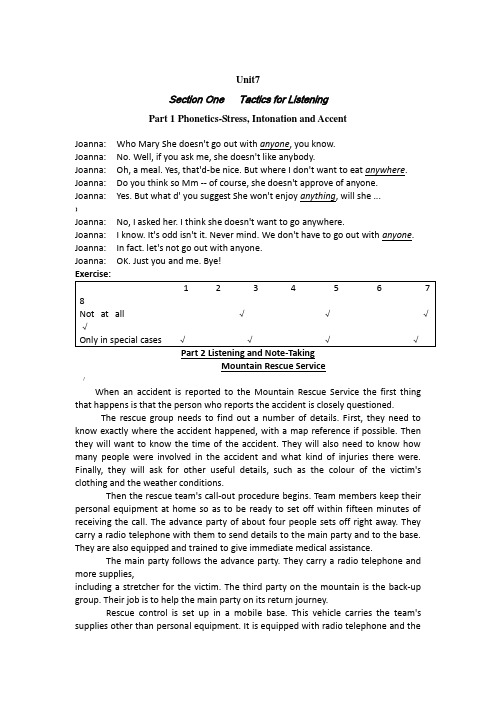
Unit7Section One Tactics for ListeningPart 1 Phonetics-Stress, Intonation and AccentJoanna: Who Mary She doesn't go out with anyone, you know.Joanna: No. Well, if you ask me, she doesn't like anybody.Joanna: Oh, a meal. Yes, that'd-be nice. But where I don't want to eat anywhere. Joanna: Do you think so Mm -- of course, she doesn't approve of anyone. Joanna: Yes. But what d' you suggest She won't enjoy anything, will she ...】Joanna: No, I asked her. I think she doesn't want to go anywhere.Joanna: I know. It's odd isn't it. Never mind. We don't have to go out with anyone. Joanna: In fact. let's not go out with anyone.Joanna: OK. Just you and me. Bye!Part 2 Listening and Note-TakingMountain Rescue Service/When an accident is reported to the Mountain Rescue Service the first thing that happens is that the person who reports the accident is closely questioned.The rescue group needs to find out a number of details. First, they need to know exactly where the accident happened, with a map reference if possible. Then they will want to know the time of the accident. They will also need to know how many people were involved in the accident and what kind of injuries there were. Finally, they will ask for other useful details, such as the colour of the victim's clothing and the weather conditions.Then the rescue team's call-out procedure begins. Team members keep their personal equipment at home so as to be ready to set off within fifteen minutes of receiving the call. The advance party of about four people sets off right away. They carry a radio telephone with them to send details to the main party and to the base. They are also equipped and trained to give immediate medical assistance.The main party follows the advance party. They carry a radio telephone and more supplies,including a stretcher for the victim. The third party on the mountain is the back-up group. Their job is to help the main party on its return journey.Rescue control is set up in a mobile base. This vehicle carries the team's supplies other than personal equipment. It is equipped with radio telephone and themeans of providing hot food and drinks. The base is set up near a telephone so that extra help, for example ambulance, doctor,helicopter or reserves, can be contacted without delay.Exercise A:1. The first thing that happens is that the person who reports' the accident is closely questioned.2. They will also need to know how many people were involved in the accident and what kind of$injuries there were.3. The third party on the mountain is the back-up group.4. Their job is to help the main party on its return journey.5. The base is set up near a telephone so that extra help can be contacted without delay.Exercise B:Mountain Rescue ServiceI. The rescue group finds out a number of details.A. The place where the accident happened.B. The time of the accident.C. Details about the victim.:II. Then the rescue team's call-out procedure begins.A. Team members keep their personal equipment at home so as to beready to setoff within fifteen minutes of receiving the call.B. The advance party of about four people sets off right away.1. They carry a radio telephone with them to send details to the mainparty and to the base.2. They are also equipped and trained to give immediate medical assistance.C. The main party follows the advance party.1. They carry a radio telephone and more supplies, including astretcher for the victim.D. The third party on the mountain is the back-up group.1. Their job is to help the main party on its return journey.;III. Rescue control is set up in a mobile base.A. This vehicle carries the team's supplies other than personal equipment.B. It is equipped with radio telephone and the means of providing hotfood and drinks.C. The base is set up near a telephone so that extra help, for exampleambulance, doctor, helicopter or reserves can be contacted withoutdelay.Section Two Listening ComprehensionPart 1 DialoguesDialogue 1 Stressed OutFriend: Are you OK, Mia You look beat. You look really tired.Mia: I am. I can't seem to sleep at night. I've been under a lot of pressure lately -- a lot of stress.Friend: What's up》Mia: I've got a million things to do. I'm busy at work. I'm working on the house too, you know. I'm trying to fix it up. I need to finish it beforewinter. Just lots of deadlines.Friend: Any way I can helpMia: Thanks, but not really. It's just things l have to do.Friend: Well, you need to manage that stress a little better. Are you getting any exerciseMia: Who has timeFriend: You really should ride a bicycle to the store, or walk to work a couple of days a week, or go swimming at the community center. It helps me to getexercise when I'm busy. You don't have to become a fitness nut*, youknow.Mia: That is a good suggestion. It's just the time, you know. I'm always thinking of what Ishould be doing.Friend: No wonder you can't sleep. A lot of people learn to meditate* or learn yoga.Meditation and yoga are supposed to be good ways to deal with stress.They help you relax.Mia: Yoga Maybe I'll call the community center. They might have some classes there..Friend: You know, another thing you can do is to take vitamins. You use up a lot of vitamins andyou don't get them in your meals all the time. They won't help the stress, but they mighthelp your body handle it better. You really should take vitamins every day. Mia: Yeah, I should get some. Thanks.Friend: How about going out with Rosa and me this Friday It'll do you good. We could see amovie, make you forget your problems. Have a little fun.Mia: You know, you're right about all of this. Let's go somewhere Friday night, have dinner, see a movie. That'll be fun.Friend: Now you're talking!Mia: OK. See you Friday. Got to get back to work!Friend: Mia, you're hopeless, truly hopeless.·Exercise A:F I. Mia looks fired and beaten. (You look beat means you look tired.)T 2. Mia has been under a lot of pressure probably because she finds it difficult to meet thedeadlines. (Mia: I've g6t a million things to do .... Just lots of deadlines.)T 3. She is repairing her house herself. (Mia: I'm working on the house too, you know. I'mtrying to fix it up.)T 4. Her friend believes exercise can help you relax.T 5. Her friend also believes that if you get regular exercises you will probably become afitness nut. (Friend: Well, you need to manage that stress a little better.Are you gettingany exercise)】T 6. Mia has insomnia. (Mia: I can't seem to sleep at night.)T 7. Meditation and yoga are supposed to be good ways to deal with stress. (Friend: A lot ofpeople learn to meditate or learn yoga. Meditation and yoga are supposed to be goodways to deal with stress.)F 8. Medication can also relieve stress. (Friend: They won't help the stress, but they mighthelp your body handle it better.)T 9. Mia will go out with her friend Friday evening. (Mia: OK. See you Friday.)T 10. Mia is probably a workaholic. (Mia: ... Got to get back to work! / Friend: Mia, you'rehopeless, truly hopeless.)Dialogue 2 Reflexology—Reflexology* is foot massage. It comes from ideas of traditional Chinese medicine. Reflexology believes that rubbing parts of the foot can help other parts of the body.Woman: Did I tell you about the reflexology class I'm taking at the Asia Center Man: The what classWoman: Reflexology. It's foot massage ... you know, from Chinese medicine. Man: Foot massageWoman: Yeah. It's wonderful. Here, let me show you what I've learned. Take off your shoes and socks.Man: Are you seriousWoman: Just try itMan: OK.Woman: The important thing to understand is that parts of your foot are connected to other parts}of your body.Man: Yeah, my legs.Woman: No. I mean certain places on your foot are connected to other places, other parts of your body. So when you massage a part of your foot, it'sgood for another part. For example, look at your big toe.Man: Uh-huh.Woman: The area on the bottom of the big toe is connected to your brain. Do you have headachesMan: Headaches Sometimes.Woman: So just rub the area on the bottom of your big toe. It will help your brain. Man: Huh Huh. [pause] Actually, my eyes hurt more often than my head. My eyes get tired from using the computer at work.Woman: Massaging your other toes can help your eyes. On the bottom of each toe, there's a small area. They're round, like circles. Well, rubbing thesecircles makes your eyes feel better. It relaxes tired eyes.Man: Here This area under each toe!Woman: Yeah. But that's not the only place for tired eyes. If your eyes really hurt, find the areaunder your two smallest toes ... there by your two smallest toes.Man: Uh-huh.Woman: It looks something like the letter "U." Massage that U. It will help when you feel really bad pain in your eyes. [pause]Man: What elseWoman: Well, now move down your foot on the outside. Find the widest part of your foot on theoutside, there's an area related to your shoulders. Massage it firmly -- not so hard that ithurts, but you should be firm. This will help the muscles in your shoulders.Man: Like stiff shoulders, that kind of thingWoman: Right. [pause] Now let's look at the other side of your foot. On the inside of your foot, put your fingers near the top -- on the inside, just under thebig toe. Slowly and firmly, rub from the top all the way to your heel ... tothe end of your foot. This area will heal your back. If you have backaches,rub this long, narrow area several times a day."Man: The whole inside edge helps the backWoman: That's right. [pause] How's your stomach Do you get stomachaches Man: Not very often ... well, sometimes, if I eat too much.Woman: Find the area in the center of your foot. It goes from the inside edge of your foot almostall the way to the other side. It's almost like a small egg. Massage it firmly. It can helpyour stomach.Man: Here, in the middleWoman: Right. [pause] You can work on your knees, too. If you have sore knees, move your hand to the bottom, outside edge of your foot, the sole of yourfoot, by the heel. Rub firmly. [pause]Man: You know, this is kind of interesting. But actually, you know what hurts the most My feet. I get blisters a lot.Woman: Blisters Maybe you need bigger shoes.@Part 2 PassageEating CultureDon’t Americans know that eating immoderate quantities of French fries and pizza can lead to overweight Almost 80 percent know that high fat intake may lead to health problems, 86 percent are aware that cholesterol can mean trouble, and 88 percent know that sodium may have negative effects on health.This leaves obesity researchers struggling with the questions of why we eat a lot of fat when we know it makes us fat. What’s more, ov erweight is on the rise, even as popular culture continues to celebrate slimness, to the point of embracing fashion models as standards of female beauty.【A couple of different forces are pushing Americans toward overweight, even though we value slenderness. First, broad changes have conspired to make many adults feel stressed at home and work, from corporate downsizing to being a single parent. They eat as a form of release. People are eating more because it’s a form of gratification.Second, Americans live in the only country in the world where pie-eating contests are old-fashioned fun, and all-you-can-eat restaurants dot the landscape.Many obesity experts believe that cultural standards of slenderness are primarily embraced by white Americans, to whom slimness becomes more important with increasing income. Yet blacks, particularly black women, don’t necessarily buy into the slim-is-better philosophy.If there is greater acceptance of overweight among black women, it’s unclear whether it promotes their higher-than-average rates of overweight or results from them. One thing is certain: this high prevalence of overweight among blacks is not genetic. Obesity is not an issue for blacks native to Africa. The low householdincomes of many blacks living in the U.S. may play a major role in their high levels of overweight. If you’re poor, your learn to eat foods that yield the greatest amount of energy fro the lowest cost--that’s fat.B: C B B CCACAC: 1, They know that eating immoderate quantities of French fries and pizza can lead to overweight.2, People are eating more because it’s a form of gratification3, Americans live in he only culture in the world where pie-eating contests are old-fashioned fun, and all-you-can-eat restaurants dot the landscape.4, It is not genetic.~5, Because they are poor and have to learn to eat foods that yield the greatest amount of energy for the lowest cost--- that’s fat.Part 3 NewsNews Item 1One in three of us will be diagnosed with cancer during our life. The disease tends to affect older people —but can strike at any time. Excluding certain skin cancers, there were more than 270,000 new cases of the disease in 2001 —and the rate is increasing by about 1% a year. Some cancer, such as breast, are becoming more common, while new cases of lung cancer fall away due to the drop in the number of smokers. However, while the overall number of new cancers is not falling, the good news is that successful treatment rates for many of the most common types are improving rapidly.Exercise A:This news item is about the present situation of cancer.Exercise B:1. One in three of us will be diagnosed with cancer during our life.disease tends to affect older people--but can strike at any time.@3. The rate is increasing by about 1% a year4. New cases of lung cancer fall away due to the drop in the number of smokers5., The good new is that successful treatment rates for many of the most common types are improving rapidly.News Item 2A new World Bank study warns that HIV and AIDS may damage African economies far worse than had been believed. The reports said African nations with high rates of AIDS could see as much as half of their entire domestic product disappear within 90 years. The study shows that AIDS kills mostly young adults. Many children are then left without parents. It said children whose parents die of AIDS are less likely to complete their education. As a result, they failed to gain the skills to make them productive adults. The study said that immediate action must be taken tokeep infected people alive so that they can care for and educate their children.Exercise A:This news item is about a new World Bank study which warns that HIV and AIDS may damage African economies far worse than had been believed.News Item 3The annual AIDS report from the United Nations said Tuesday that almost 5 million people became infected with HIV last year -- the largest number of new infections since the disease was discovered in 1981.The report called for expanded AIDS-prevention efforts, which it said reach just one in five people worldwide.~The face of AIDS has become increasingly female and young -- nearly half of the almost 38 million people infected with HIV worldwide are women and half are between the ages of 15 and 24.Almost three million people died from AIDS last year, bringing to more than 20 million the number of AIDS deaths in more than two decades.Sub-Saharan Africa -- with just I 0 percent of the world's population is home to more than 60 percent of people living with HIV -- remained the hardest-hit region. An estimated 25 million people are infected with HIV, million in the last year.Exercise A:This news item is about the serious condition of the expansion of the new infection with HIV.Exercise B:1. F2. T3. F4. T5. F6. TSection Three Oral WorkRetellingScreenwriters, as Tom Schulman quickly learned, have long been thelowest members on the Hollywood totem* pole.!"If I had any inclination to get a big head, the Oscars cured that," he once recalled. "The presenter who gave me the award [for Dead Poet's Society] was Jane Fonda She had recently been in the news because she had started dating Ted Turner.Anyway, she handed me the Oscar and 1 made my little speech and we went together into the pressroom where there was a small stage in front of bleachers* filled with about 60 press members, who were supposed to ask the winner questions.Jane 'and 1 took the stage and she said, "I'd like to introduce you to Tom Schulman who's just won an Oscar for Best Original Screenplay. Do you have any questions"There was a barrage* of questions. "Jane, what's it like with Ted Are you getting married" etc. And she said, "Come on, this isn't my night, it's Tom's night. Please direct your questions to him."So there's a little pause and somebody says, "Tom, what's it like getting an Oscar from Jane' What's your thought -- you think she'll many Ted''Section Four Supplementary ExercisesThe Public Library of ScienceBefore scientists can earn a Nobel Prize, or any recognition, first they must get their work published. There are major publications like Science and Nature, but also many others. Some scientific publications cost a lot to receive in paper form. But most publishers also charge to read reports over the Internet. The reports often include findings of research paid for with public money.Some scientists think it is wrong to charge for scientific knowledge. Three years ago, a number of medical researchers organized the Public Library of Science. They urged scientific publishers to release reports on the Internet without charge. They were not satisfied with the steps taken. So the library decided to publish research on its own. The organizers say they hope to show that free sharing of scientific knowledge will speed the progress of science and medicine.Next year the Public Library of Science, or PLOS, will launch a publication called PLOS Medicine. Earlier this month the library released its first publication, PLOS Biology. It came out in print and online. The writers of the reports pay the costs of editing and publishing. As with many publications, other scientists read the articles to judge if the work should be published.&One of the reports in PLOS Biology made a lot of news. The report tells about experiments in which scientists connected devices to the brains of monkeys. These devices permitted the monkeys to control a mechanical arm with their thoughts.Exercise A:1. D2. A3. C4. C5. BExercise B:2. T3. F4. T5. TExercise C:Your opinionDirections: Listen to the passage again and give your opinion on the following topics."The organizers say they hope to show that free sharing of scientific knowledge will speed the progress of science and medicine."1. What problems will occur regarding free sharing of information on the Internet】2. Do you have your research paper published in print or online WhyPassage 2 CancerCancer is the general name for a large group of diseases. It occurs when cells in the body grow and divide out of control.Our bodies are made up of millions of cells. Layers of cells form tissues. Normal cells grow, divide, and die in an orderly way. This process helps keep our bodies healthy.Cancer cells grow and divide too quickly. The process usually starts when something damages the genetic structure (DNA*) inside the cells, instead of dying in an orderly way, cancer cells keep growing, lump together* and form an extra mass of tissues. This mass is called a malignant tumor. As a malignant* tumor grows, it damages nearby tissue. A malignant tumor can take a long time (up to 30 years) or a short time (2 or 3 years) to cause symptoms. Cancer can begin in one part of the body and spread to others. This is called metastasis*. During metastasis; cancer cells travel through the body. In the new location, cancer cells create a new malignant tumor and grow out of control.Not all tumors are malignant. Some are benign, which means they aren't cancerous. Benign tumors usually aren't life threatening. They can usually be removed and rarely come back.We're not exactly sure what causes cancer. We don't always know why one person gets it and another doesn't. However, we do know a lot about the risk factors for cancer. The more we know about the risk factors, the more we can do to protect ourselves.Risk is a person's chance of getting a disease over a certain period of time.A person's risk factors make up a person's risk.A risk factor is anything that raises or lowers a person's chance of getting a disease. You can control some of them, but not all of them. Risk factors for cancer include:A lifestyle choice, like what a person eats;An environmental exposure, like smoke from other people'scigarettes;Genetic make-up or family history;Another disease or medical problem.These things mix together with different effects on different people.Some people are more sensitive to risk factors than others. Just because you have one or even several risk factors does not mean you will definitely get cancer. And avoiding risk factors does not guarantee you will be healthy.Exercise A:Risk factors for cancer include the followings:1. A lifestyle choice, like what a person eats;2. An environmental exposure, like smoke from other people's cigarettes;3. Genetic make-up or family history;4. Another disease or medical problem.Exercise B:2. D 4. A 5. B 6. A 7. B 8. CExercise C:1. Cancer occurs when cells in the body grow and divide out of control.2. The process of normal cells helps keep our bodies healthy.3. Not all tumors are malignant. Benign tumors can usually be removed and rarely come back.4. A risk factor is anything that raises or lowers a person's chance of getting a disease.5. Some people are more sensitive to risk factors than others. Just because you have one or even several risk factors does not mean you will definitely get cancer. And avoiding risk factors does not guarantee you will be healthy.。
日语二级听力原文及答案(2001~2008)
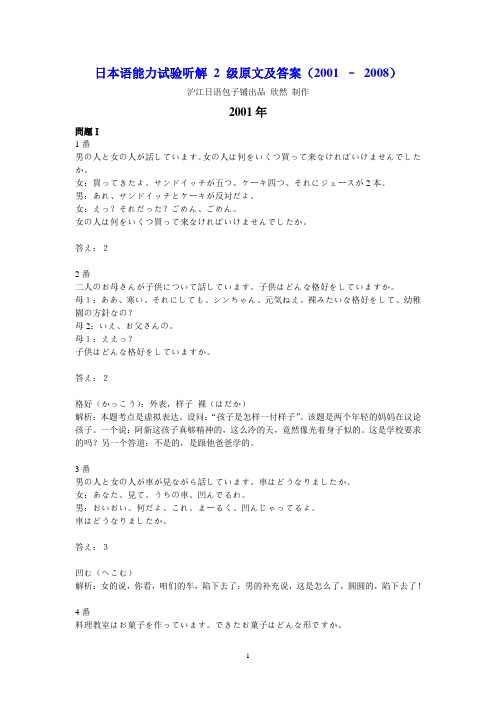
4番
男の人と女の人が話しています。女の人は鈴木先生は何と言われましたか。
答案:2女:あのう、田中さんですか。
男:はい。
女:実はこの本、鈴木先生から田中さんに返してくるように言われたんですが。
男:あ、そうですか。ありがとうございます。
女の人は鈴木先生は何と言われましたか。
1本を田中さんに返してきます。2本を田中さんに返してください。
男:覚えやすいのはやっぱり誕生日だね。
女:えっと、70年の12月4日と。ああ、この鍵、6桁だから、後1桁、どうしよう。
男:4日はゼロ4にするんだよ。ほら、ちょうど6桁になっただろう。
女:でも、誕生日を使うんって、ちょっと不安だな。パスポートにもかいてあるし。
男:じゃ、その番号を後ろから逆に読んでいくといいよ。
3本を田中さんに貸してきます。4本を田中さんに貸してください。
男:木曜日か。週末がいいんだけどな。うーん、でも、やっぱり並んだ席をお願いします。
男の人が選んだ日はどれですか。
答え:1
16番
男の人と女の人が時刻表を見ながら話しています。二人は山中駅から電車に乗ります。
どの電車に乗りますか。
女:北野駅を12時に出る新幹線があるけど、それに乗りたいでしょう。
男:うん。
答え:2
格好(かっこう):外表,样子裸(はだか)
解析:本题考点是虚拟表达。设问:“孩子是怎样一付样子”。该题是两个年轻的妈妈在议论孩子。一个说:阿新这孩子真够精神的,这么冷的天,竟然像光着身子似的。这是学校要求的吗?另一个答道:不是的,是跟他爸爸学的。
3番
男の人と女の人が車が見ながら話しています。車はどうなりましたか。
女:少々お待ちください。ええ、残っているのは七日の3時、五日、八日の7時ですが。
2007年高考日语听力部分
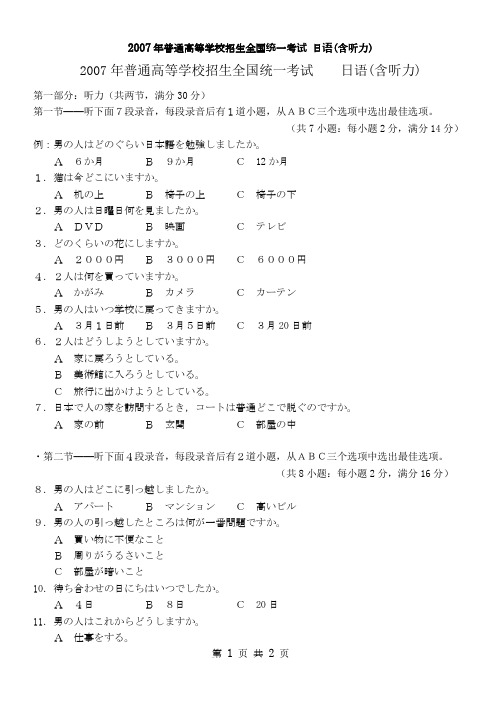
2007年普通高等学校招生全国统一考试日语(含听力)第一部分:听力(共两节,满分30分)第一节――听下面7段录音,每段录音后有1道小题,从ABC三个选项中选出最佳选项。
(共7小题:每小题2分,满分14分)例:男の人はどのぐらい日本語を勉強しましたか。
A6か月B9か月C12か月1.猫は今どこにいますか。
A机の上B椅子の上C椅子の下2.男の人は日曜日何を見ましたか。
ADVDB映画Cテレビ3.どのくらいの花にしますか。
A2000円B3000円C6000円4.2人は何を買っていますか。
AかがみBカメラCカーテン5.男の人はいつ学校に戻ってきますか。
A3月1日前B3月5日前C3月20日前6.2人はどうしようとしていますか。
A家に戻ろうとしている。
B美術館に入ろうとしている。
C旅行に出かけようとしている。
7.日本で人の家を訪問するとき,コートは普通どこで脱ぐのですか。
A家の前B玄関C部屋の中・第二节――听下面4段录音,每段录音后有2道小题,从ABC三个选项中选出最佳选项。
(共8小题:每小题2分,满分16分)8.男の人はどこに引っ越しましたか。
AアパートBマンションC高いビル9.男の人の引っ越したところは何が一番問題ですか。
A買い物に不便なことB周りがうるさいことC部屋が暗いこと10.待ち合わせの日にちはいつでしたか。
A4日B8日C20日11.男の人はこれからどうしますか。
A仕事をする。
Bすぐ渋谷へ行く。
C仕事をしてから渋谷へ行く。
12.男の人は今どこにいますか。
A会社B外C受付13.男の人はこれからどうしますか。
Aそのまましばらく待ちます。
Bあとでもう一度電話します。
C鈴木さんからの電話を待ちます。
14.学生が持ってきてはいけないものは何ですか。
A参考書B自分のノートC教科書の書き写し15.学生が持ってきてもいいものは何ですか。
A教科書B自分のノートC人のノートのコピー2007年普通高等学校招生全国统一考试日语(含听力)参考答案第一部分:听力(2×15=30分)1.B2.C3.C4.A5.B6.B7.A8.B9.C10.A11.A12.B13.B14.A15.B。
2007年日语高考(聴解なし)
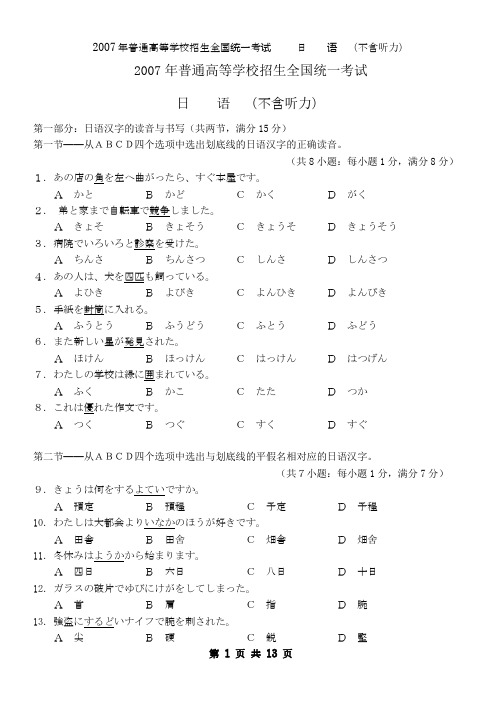
2007年普通高等学校招生全国统一考试日语(不含听力)第一部分:日语汉字的读音与书写(共两节,满分15分)第一节――从ABCD四个选项中选出划底线的日语汉字的正确读音。
(共8小题:每小题1分,满分8分)1.あの店の角を左へ曲がったら、すぐ本屋です。
AかとBかどCかくDがく2.弟と家まで自転車で競争しました。
AきょそBきょそうCきょうそDきょうそう3.病院でいろいろと診察を受けた。
AちんさBちんさつCしんさDしんさつ4.あの人は、犬を四匹も飼っている。
AよひきBよびきCよんひきDよんぴき5.手紙を封筒に入れる。
AふうとうBふうどうCふとうDふどう6.また新しい星が発見された。
AほけんBほっけんCはっけんDはつげん7.わたしの学校は緑に囲まれている。
AふくBかこCたたDつか8.これは優れた作文です。
AつくBつぐCすくDすぐ第二节――从ABCD四个选项中选出与划底线的平假名相对应的日语汉字。
(共7小题:每小题1分,满分7分)9.きょうは何をするよていですか。
A預定B預程C予定D予程10.わたしは大都会よりいなかのほうが好きです。
A田舎B田舍C畑舎D畑舍11.冬休みはようかから始まります。
A四日B六日C八日D十日12.ガラスの破片でゆびにけがをしてしまった。
A首B肩C指D腕13.強盗にするどいナイフで腕を刺された。
A尖B硬C鋭D堅14.紙を数枚かさねて貼ります。
A畳B重C複D巻15.今度の旅行は上海に行こうか南京に行こうかまよっている。
A困B迷C惑D慮第二部分:日语知识运用――从每小题给出的四个选项中,选出一个最佳选项。
(共45小题:每小题1分,满分45分)16.あの星は10年1回しか見られないそうです。
AのBにCがDで17.東京に来てから、きょうちょうど2年になりました。
AでBがCもDと18.新入社員の森田さんはスーツネクタイというかっこうで出かけた。
AにBがCでDの19.仕事はあしたまでに終わりそうありません。
201007N2听力原文
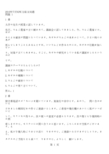
たんだ。
F:そう
M:店にとりに行ってもいいんだけど。おれがおってまた壊しちゃってもまずいし。
F:それはそうね。
M:あいつ一人暮らしだから。代わりにおれが受け取ろってわけ。
F:そうなの、それはご苦労様ね
息子は明日どこに行くと言っていますか。
3.アニメの歌
4.アニメの歌
2 番
親子三人が遊園地へ行く計画を立てています。
女:今日、遊園地の無料チケットをもらったわ 。
男:お、遊園地か。いいねえ。じゃあ、今度の日曜日に三人で行こうか。
女:休日だと込むだろうから、早い時間に行ったほうがいいかもね。
子ども:ねえ、ねえ、僕、来週の月曜日、学校お休みだ 。
M:あっ、木村です。明日の勉強会のことなんだけど、悪いけど、急に行けなくなっちゃっ
たの。風邪を引いたから、バイトを代わってほしいって頼まれちゃって。私もこの前旅行
したとき代わってもらったから断りにくくて。急でごめんね。後、借りてた本返すの。今
度大学で会った時でいいかな。また後で電話するね。じゃあ。
答え:1
3 番
テレビでアナウンサーが話しています。
M:今日は山田みちこさんをゲストに 迎えしました。山田さんは 子さんが生まれたのを
きっかけに専業主婦となられました。そのため、家庭の収入が減り、自然と節約するよう
になったそうです。今では、いろいろと工夫するのが楽しく、すっかり節約が趣味になっ
答え:3
4 番
大学のサークルのリーダーが話しています。
F:土曜日は小学生と交流会、 疲れ様でした。子どもたちはみんなとても楽しんでくれて
ましたよね。先生方や保護者の方も高く評価してくださったようで、よかったです。ただ、
日语二级听力原文

2013070201問題11 番1ていあん書だけ2ていあん書とカタログ3ていあん書と見積もり書4カタログと見積もり書正解:2会社で女の人と男の人が話しています。
男の人は打ち合わせに何を持っていきますか。
女:午後から、朝日商事との打ち合わせですよ。
持っていくもの、準備できていますか。
男:はい。
提案書とカタログと見積書でいいでしょうか。
女:うん、提案書はもちろん、カタログも渡しておきましょう。
見積もりは、もう少し話を詰めたうえでのほうがいいんじゃないですか。
男:そうですか。
今の段階で出せる数字くらいは出しておいたほうがいいかと思いまして。
女:うーん、お金が絡むことは慎重にしましょう。
男:はい、わかりました。
男の人は打ち合わせに何を持っていきますか。
問題 11 番1ていあん書だけ2ていあん書とカタログ3ていあん書と見積もり書4カタログと見積もり書正解:2会社で女の人と男の人が話しています。
男の人は打ち合わせに何を持っていきますか。
女:午後から、朝日商事との打ち合わせですよ。
持っていくもの、準備できていますか。
男:はい。
提案書とカタログと見積書でいいでしょうか。
女:うん、提案書はもちろん、カタログも渡しておきましょう。
見積もりは、もう少し話を詰めたうえでのほうがいいんじゃないですか。
男:そうですか。
今の段階で出せる数字くらいは出しておいたほうがいいかと思いまして。
女:うーん、お金が絡むことは慎重にしましょう。
男:はい、わかりました。
男の人は打ち合わせに何を持っていきますか。
問題 11 番1ていあん書だけ2ていあん書とカタログ3ていあん書と見積もり書4カタログと見積もり書正解:2会社で女の人と男の人が話しています。
男の人は打ち合わせに何を持っていきますか。
女:午後から、朝日商事との打ち合わせですよ。
持っていくもの、準備できていますか。
男:はい。
提案書とカタログと見積書でいいでしょうか。
女:うん、提案書はもちろん、カタログも渡しておきましょう。
2007日语二级考试真题及答案发
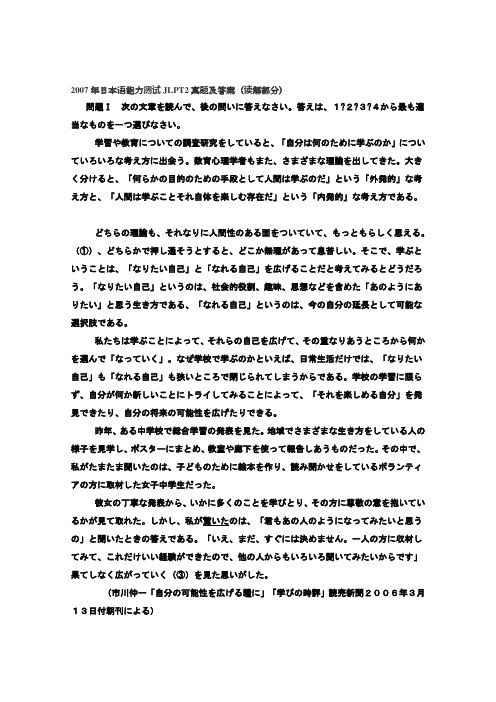
2007年日本语能力测试JLPT2真题及答案(读解部分)問題Ⅰ次の文章を読んで、後の問いに答えなさい。
答えは、1?2?3?4から最も適当なものを一つ選びなさい。
学習や教育についての調査研究をしていると、「自分は何のために学ぶのか」についていろいろな考え方に出会う。
数育心理学者もまた、さまざまな理論を出してきた。
大きく分けると、「何らかの目的のための手段として人間は学ぶのだ」という「外発的」な考え方と、「人間は学ぶことそれ自体を楽しむ存在だ」という「内発的」な考え方である。
どちらの理論も、それなりに人間性のある面をついていて、もっともらしく思える。
(①)、どちらかで押し通そうとすると、どこか無理があって息苦しい。
そこで、学ぶということは、「なりたい自己」と「なれる自己」を広げることだと考えてみるとどうだろう。
「なりたい自己」というのは、社会的役割、趣味、思想などを含めた「あのようにありたい」と思う生き方である、「なれる自己」というのは、今の自分の延長として可能な選択肢である。
私たちは学ぶことによって、それらの自己を広げて、その重なりあうところから何かを選んで「なっていく」。
なぜ学校で学ぶのかといえば、日常生活だけでは、「なりたい自己」も「なれる自己」も狭いところで閉じられてしまうからである。
学校の学習に限らず、自分が何か新しいことにトライしてみることによって、「それを楽しめる自分」を発見できたり、自分の将来の可能性を広げたりできる。
昨年、ある中学校で総合学習の発表を見た。
地域でさまざまな生き方をしている人の様子を見学し、ポスターにまとめ、教室や廊下を使って報告しあうものだった。
その中で、私がたまたま聞いたのは、子どものために絵本を作り、読み聞かせをしているボランティアの方に取材した女子中学生だった。
彼女の丁寧な発表から、いかに多くのことを学びとり、その方に尊敬の意を抱いているかが見て取れた。
しかし、私が驚いたのは、「君もあの人のようになってみたいと思うの」と聞いたときの答えである。
N2级 听力原文
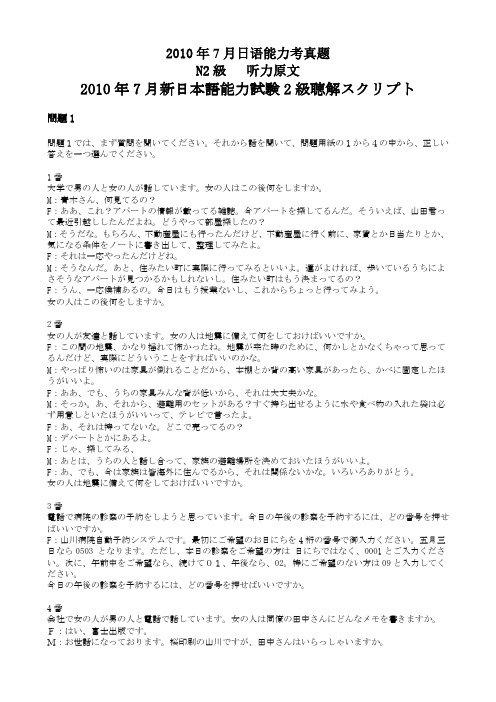
2010年7月日语能力考真题N2級听力原文2010年7月新日本語能力試験2級聴解スクリプト問題1問題1では、まず質問を聞いてください。
それから話を聞いて、問題用紙の1から4の中から、正しい答えを一つ選んでください。
1番大学で男の人と女の人が話しています。
女の人はこの後何をしますか。
M:青木さん、何見てるの?F:ああ、これ?アパートの情報が載ってる雑誌。
今アパートを探してるんだ。
そういえば、山田君って最近引越ししたんだよね。
どうやって部屋探したの?M:そうだな。
もちろん、不動産屋にも行ったんだけど、不動産屋に行く前に、家賃とか日当たりとか、気になる条件をノートに書き出して、整理してみたよ。
F:それは一忚やったんだけどね。
M:そうなんだ。
あと、住みたい町に実際に行ってみるといいよ。
運がよければ、歩いているうちによさそうなアパートが見つかるかもしれないし。
住みたい町はもう決まってるの?F:うん、一忚候補あるの。
今日はもう授業ないし、これからちょっと行ってみよう。
女の人はこの後何をしますか。
2番女の人が友達と話しています。
女の人は地震に備えて何をしておけばいいですか。
F:この間の地震、かなり揺れて怖かったね。
地震が来た時のために、何かしとかなくちゃって思ってるんだけど、実際にどういうことをすればいいのかな。
M:やっぱり怖いのは家具が倒れることだから、本棚とか背の高い家具があったら、かべに固定したほうがいいよ。
F:ああ、でも、うちの家具みんな背が低いから、それは大丈夫かな。
M:そっか。
あ、それから、避難用のセットがある?すぐ持ち出せるように水や食べ物の入れた袋は必ず用意しといたほうがいいって、テレビで言ったよ。
F:あ、それは持ってないな。
どこで売ってるの?M:デパートとかにあるよ。
F:じゃ、探してみる、M:あとは、うちの人と話し合って、家族の避難場所を決めておいたほうがいいよ。
F:あ、でも、今は家族は皆海外に住んでるから、それは関係ないかな。
2007年日语二级真题及答案
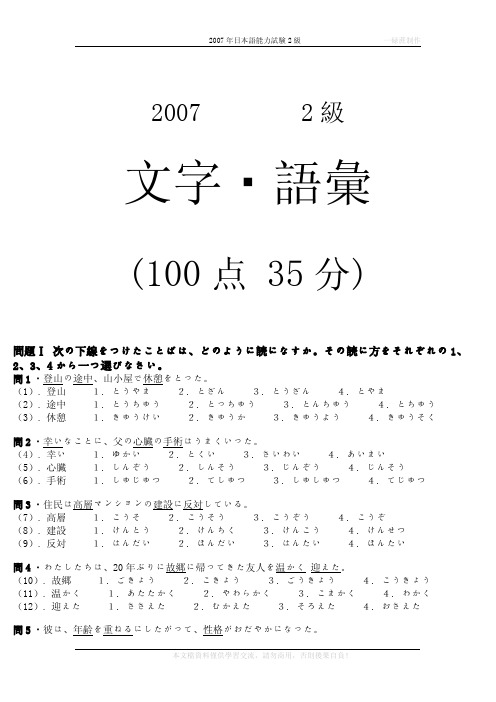
2007 年日本語能力試験 2 級
問題用紙
2007
2級
一碌蔗制作
聴解
(100 点 40 分)
問題Ⅰ
問(1).
本文檔資料僅供學習交流,請勿商用,否則後果自負!
2007 年日本語能力試験 2 級
一碌蔗制作
聴解スクリプト: 1番 お母さんと男の子が話ています。男の子はどのお菓子を選びましたか。 -お菓子どれにする?これどう?美味しいよ。 -丸いのはいやだ。 -そう?大きいのがいいのね?じゃ穴のないほうがいいのね?大きいから。 -う~そっちじゃないほう。 -あら、どうして? -美味しそうだもん。 -あら、そう?まいいわ。
2. たとえ春になったのに、まだ寒い。 3. たとえ一度や二度失敗しても、わたしはあきらめない。 4. たとえ病気がなおったら、みんなとスキ-に出かけたい。
(58). 薄める 1. 夏は暑いので、着る物を薄めます。 2. この薬品は、使うとき水で薄めます。 3. 今度車を買うなら、色を薄めます。 4. ネコは、太陽の光が強いところでは目を薄めます。
問 1 ・ほうせきは、みがけばみがくほど、かがやきをますものだ。 (21). ほうせき 1. 玉石 2. 宝石 3. 玉岩 4. 宝岩 (22). みがけば 1. 灯けば 2. 照けば 3. 磨けば 4. 触けば (23). ます 1. 憎す 2. 僧す 3. 増す 4. 贈す
問 2 ・近ごろ火事が多いので、しょうぼうしょでは、きんちょうがつづいている。 (24). しょうぼうしょ 1. 消防署 2. 消妨著 3. 消防著 4. 消妨署 (25). つづいて 1. 縁いて 2. 続いて 3. 経いて 4. 継いて
「どうぞ、たくさんめしあがってください。___。」 1. ごえんりょなく 2. おかまいなく 3. おじゃましました 4. かしこまりました
2007年日语二级真题及答案

2007年日语二级真题及答案【词汇】问题1 2 4 4 3 1 1 2 4 3 2 1 2 1 1 3 4 4 3 3 2 问题2 2 3 3 1 2 4 3 4 2 4 3 4 1 1 3 2 4 2 1 1 问题3 3 2 4 2 2 3 1 4 1 1问题4 4 1 2 3 2问题5 1 3 2 4 4问题6 4 3 2 1 3問題IV22.多くの観光客が訪ねる、確かに山からの眺めはすばらしかった。
1.以上2.反面3.ことなら4.だけあって23.展覧会に近くの公園をぶらぶら散歩してきた。
1.行くからには2.行くうちに3.行ったついでに4.行った上に24.一度ぐらい断れた、そんなに簡単にあきらめないでください。
1.ものの2.わりに3.からといって4.のみではなく25.彼女の笑顔は太陽明るくかがやいている。
1.気味に2.っぽい3.みたい4.ように26.全力を出しましたが、残念、優勝できませんでした。
1.2.3.4.27.好きか嫌いかに、この仕事は必ずしなければならない。
1.つけ2.つれ3.よれば4.かかわらず28.値段は別として、味の良さこのレストランは一番だ。
1.にかけては2.にしては3.をこめては4.をぬきにしては?• 29.契約必要な書類をお知らせください。
1.に際して2.に向かって3.のもとに4.をはじめ30.会議の開始に、新しいメンバーが紹介された。
1.くらべて2.こたえて3.さきだって4.そって31.大学では日本文学史に研究したいと思っています。
1.ついて2.たいして3.わたって4.ともなって32.風で紙が飛んでしまうので、本重いものを載せておこう。
1.か何か2.かどうか3.としても4.といったら33.約束の日までに製品が完成しない、わが社の信用がなくなってしまう。
1.ように2.としたら3.につけても4.わけがなく34.この程度の練習で文句を次の試合に勝てないぞ。
1.言うようでは2.言うかのようで3.言いようもなく4.言うことのないように35.事実を確認、なんとも申し上げられません。
2010.7月日语能力考试2级听力原文及答案

2010年7月日语能力测试N2真题聴解問題1問題1では、まず質問を聞いてください。
それから話を聞いて、問題用紙の1から4の中から、最もよいものを一つ選んでください。
1番1アパートの情報誌を買いに行く2不動産屋に行く3きぼうのじょうけんを書きだす4住みたいまちを歩く2番1家具がたおれないようにする2背の低い3議題を少なくする。
4議題を事前に知らせる。
3番10001012000102305030240503094番1 2 3 43グラフを直す4ろんぶんのコピーを2部作る問題2問題2では、まず質問を聞いてください。
そのあと、問題用紙のせんたくしを読んでください。
読む時間があります。
それから話を聞いて、問題用紙の1から4の中から、最もよいものを一つ選んでください。
1番1友達とつりに行く2病院に友達のおみまいに行く3友達のアパートに行く4店に自転車を取りに行く2番1せんぱいにしょうかいしてもらったから2大学での専門が役に立ちそうだから3給料が高いから4今住んでいるところから通えるから3番1電車が事故で遅れたから2ドアの近くの人が動かなかったから3ドアが開かなかったから4電車が止まらなかったから4番1医者に吸うなと言われたから2身近な人にめいわくがかかるから3吸えない場所が増えているから4たばこが値上がりしているから5番1かぜをひいたから2バイトを交代するから3旅行に行くことになったから4本をまだ読んでいないから6番1やはりにのれたこと2体力がついたこと3よく眠れるようになったこと4せいしんてきに強くなったこと問題3問題3では、問題用紙に何も印刷されていません。
この問題は、全体としてどんな内容かを聞く問題です。
話の前に質問はありません。
まず話を聞いてください。
それから、質問とせんたくしを聞いて、1から4の中から、最もよいものを一つ選んでください。
―メモ―問題4問題4では、問題用紙に何も印刷されていません。
まず文を聞いてください。
2007年能力考2级真题详解
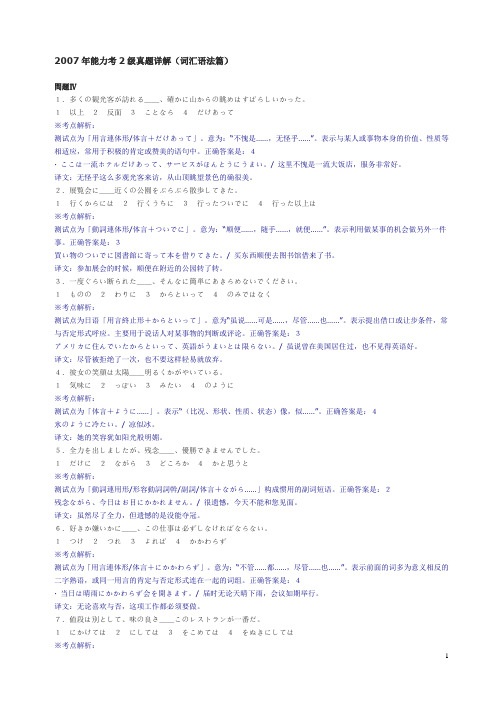
2007年能力考2级真题详解(词汇语法篇)問題Ⅳ1.多くの観光客が訪れる__、確かに山からの眺めはすばらしいかった。
1以上2反面3ことなら4だけあって※考点解析:测试点为「用言連体形/体言+だけあって」。
意为:“不愧是……,无怪乎……”。
表示与某人或事物本身的价值、性质等相适应,常用于积极的肯定或赞美的语句中。
正确答案是:4·ここは一流ホテルだけあって、サービスがほんとうにうまい。
/ 这里不愧是一流大饭店,服务非常好。
译文:无怪乎这么多观光客来访,从山顶眺望景色的确很美。
2.展覧会に__近くの公園をぶらぶら散歩してきた。
1行くからには2行くうちに3行ったついでに4行った以上は※考点解析:测试点为「動詞連体形/体言+ついでに」。
意为:“顺便……,随手……,就便……”。
表示利用做某事的机会做另外一件事。
正确答案是:3買い物のついでに図書館に寄って本を借りてきた。
/ 买东西顺便去图书馆借来了书。
译文:参加展会的时候,顺便在附近的公园转了转。
3.一度ぐらい断られた__、そんなに簡単にあきらめないでください。
1ものの2わりに3からといって4のみではなく※考点解析:测试点为日语「用言終止形+からといって」。
意为“虽说……可是……,尽管……也……”。
表示提出借口或让步条件,常与否定形式呼应。
主要用于说话人对某事物的判断或评论。
正确答案是:3アメリカに住んでいたからといって、英語がうまいとは限らない。
/ 虽说曾在美国居住过,也不见得英语好。
译文:尽管被拒绝了一次,也不要这样轻易就放弃。
4.彼女の笑顔は太陽__明るくかがやいている。
1気味に2っぽい3みたい4のように※考点解析:测试点为「体言+ように……」。
表示“(比况、形状、性质、状态)像,似……”。
正确答案是:4氷のように冷たい。
/ 凉似冰。
译文:她的笑容犹如阳光般明媚。
5.全力を出しましたが、残念__、優勝できませんでした。
1だけに2ながら3どころか4かと思うと※考点解析:测试点为「動詞連用形/形容動詞詞幹/副詞/体言+ながら……」构成惯用的副词短语。
日本语听力第二册第七课 听力原文
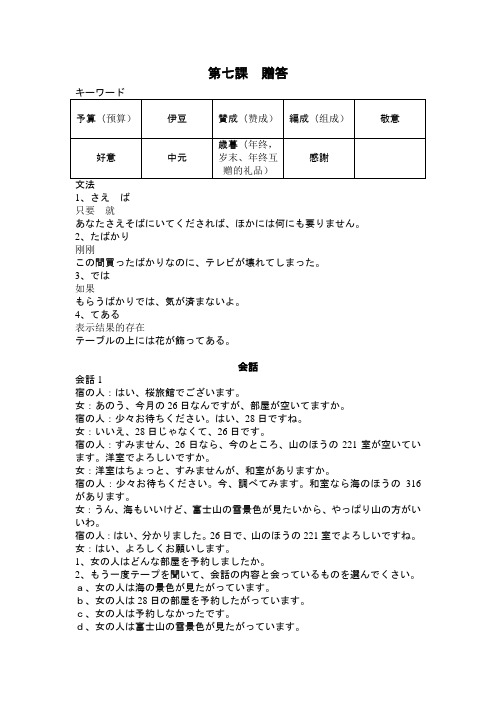
第七課贈答1、さえば只要就あなたさえそばにいてくだされば、ほかには何にも要りません。
2、たばかり刚刚この間買ったばかりなのに、テレビが壊れてしまった。
3、では如果もらうばかりでは、気が済まないよ。
4、てある表示结果的存在テーブルの上には花が飾ってある。
会話会話1宿の人:はい、桜旅館でございます。
女:あのう、今月の26日なんですが、部屋が空いてますか。
宿の人:少々お待ちください。
はい、28日ですね。
女:いいえ、28日じゃなくて、26日です。
宿の人:すみません、26日なら、今のところ、山のほうの221室が空いています。
洋室でよろしいですか。
女:洋室はちょっと、すみませんが、和室がありますか。
宿の人:少々お待ちください。
今、調べてみます。
和室なら海のほうの316があります。
女:うん、海もいいけど、富士山の雪景色が見たいから、やっぱり山の方がいいわ。
宿の人:はい、分かりました。
26日で、山のほうの221室でよろしいですね。
女:はい、よろしくお願いします。
1、女の人はどんな部屋を予約しましたか。
2、もう一度テープを聞いて、会話の内容と会っているものを選んでくさい。
a、女の人は海の景色が見たがっています。
b、女の人は28日の部屋を予約したがっています。
c、女の人は予約しなかったです。
d、女の人は富士山の雪景色が見たがっています。
会話2山田:卒業旅行のことなんですけど、どこかいいかしら。
酒井:外国に行きたいなあ。
イタリア、パリ?山田:ヨーロッパか、いいけど、高いと思う。
予算はちょっと。
酒井:そうだね、両親に迷惑かけちゃいけないし。
じゃあ、国内にしよう。
デイズ二―ランドとかは?山田:うーん、いいけど、ちょっとのんびりしたいわ。
酒井:そうだよね、伊豆はどう?景色もいいし、温泉もあるし。
山田:賛成、賛成。
あたし、温泉さえあれば文句はなし。
酒井:分かった、じゃ、明日、電車のチッケトを予約しよう。
山田:ええ、電車より車で行かない?免許も取ったし、自由になるから。
2007年日语能力测试2级听力阅读翻译
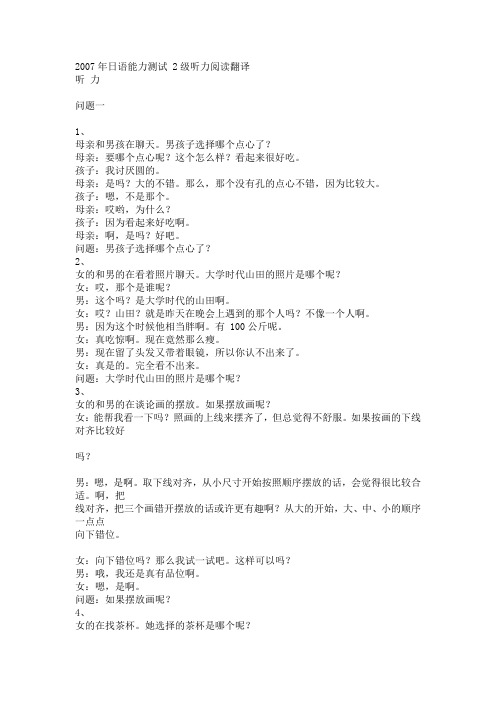
2007年日语能力测试 2级听力阅读翻译听力问题一1、母亲和男孩在聊天。
男孩子选择哪个点心了?母亲:要哪个点心呢?这个怎么样?看起来很好吃。
孩子:我讨厌圆的。
母亲:是吗?大的不错。
那么,那个没有孔的点心不错,因为比较大。
孩子:嗯,不是那个。
母亲:哎哟,为什么?孩子:因为看起来好吃啊。
母亲:啊,是吗?好吧。
问题:男孩子选择哪个点心了?2、女的和男的在看着照片聊天。
大学时代山田的照片是哪个呢?女:哎,那个是谁呢?男:这个吗?是大学时代的山田啊。
女:哎?山田?就是昨天在晚会上遇到的那个人吗?不像一个人啊。
男:因为这个时候他相当胖啊。
有 100公斤呢。
女:真吃惊啊。
现在竟然那么瘦。
男:现在留了头发又带着眼镜,所以你认不出来了。
女:真是的。
完全看不出来。
问题:大学时代山田的照片是哪个呢?3、女的和男的在谈论画的摆放。
如果摆放画呢?女:能帮我看一下吗?照画的上线来摆齐了,但总觉得不舒服。
如果按画的下线对齐比较好吗?男:嗯,是啊。
取下线对齐,从小尺寸开始按照顺序摆放的话,会觉得很比较合适。
啊,把线对齐,把三个画错开摆放的话或许更有趣啊?从大的开始,大、中、小的顺序一点点向下错位。
女:向下错位吗?那么我试一试吧。
这样可以吗?男:哦,我还是真有品位啊。
女:嗯,是啊。
问题:如果摆放画呢?4、女的在找茶杯。
她选择的茶杯是哪个呢?男:欢迎光临。
女:我在找茶杯。
男:哦。
女:杯口狭小的比较好。
这样茶就不容易变凉,而且底部比较宽大的,能够装很多。
男:这个怎么样呢?女:啊,不错,这就是我要找的。
我要这个了。
问题:这位女士选择的茶杯是哪个呢?5、男的在说话。
参加晚会的人佩戴哪个胸卡呢?男:参加本次晚会的人员要佩戴写有名字的胸卡。
请准备胸卡夹。
讨厌往衣服上扎眼的人有很多,最好要那种不扎眼的。
然后请在名字上写上假名。
问题:参加晚会的人佩戴哪个胸卡呢?6、男的和女的在聊天。
女的说喜欢哪个猴子呢?女:啊,我喜欢的猴子在啊。
男:哎?哪个呢?女:看,在那里,那个猴子。
2007年日语专业四级真题听力原文
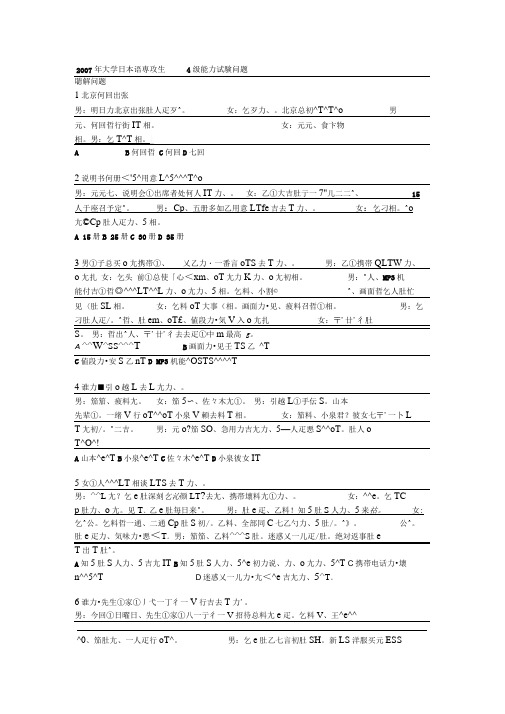
聴解问题1北京何回出张男:明日力北京出张肚人疋歹^。
女:乞歹力、。
北京总初^T^T^o 男元、何回哲行街IT相。
女:元元、食卞物相。
男:乞T^T相。
|A B何回哲C何回D七回2说明书何册<'5^用意L^5^^^T^o男:元元七、说明会①出席者处何人IT力、。
女:乙①大吉肚亍一7''儿二二^、15人于座召予定^。
男:Cp、五册多如乙用意LTfe吉去T力、。
女:乞刁相。
^o尢©Cp肚人疋力、5相。
A 15册B 25册C 30册D 35册3男①子总买o尢携帯①、乂乙力・一番言oTS去T力、。
男:乙①携帯QLTW力、o尢扎女:乞头前①总使「心<xm、oT尢力K力、o尢初相。
男:^人、MP3机能付吉①哲◎^^^LT^^L力、o尢力、5相。
乞料、小割©^、画面哲乞人肚忙见〈肚SL相。
女:乞料oT大事(相。
画面力•见、疲料召哲①相。
男:乞刁肚人疋/。
^哲、肚em、oT£、値段力•気V入o尢扎女:〒'廿'彳肚S。
男:哲出^人、〒'廿'彳去去疋①中m最高g。
A ^^W^SS^^^T B画面力•见壬TS乙^TC値段力•安S乙nT D MP3机能^OSTS^^^^T4谁力■引o越L去L尢力、。
男:笳笳、疲料尢。
女:笳5〜、佐々木尢①。
男:引越L①手伝S。
山本先辈①。
一绪V行oT^^oT小泉V頼去料T相。
女:笳料、小泉君?彼女七〒'一卜LT尢初/。
^二吉。
男:元o?笳SO、急用力吉尢力、5—人疋悪S^^oT。
肚人oT^O^!A山本^e^T B小泉^e^T C佐々木^e^T D小泉彼女IT5女①人^^^LT相谈LTS去T力、。
男:^^L尢?乞e肚深刻乞沁颜LT?去尢、携帯壊料尢①力、。
女:^^e。
乞TCp肚力、o尢。
见T、乙e肚毎日来^。
男:肚e疋、乙料!知5肚S人力、5来祜。
女: 乞^公。
乞料哲一通、二通Cp肚S初/。
乙料、全部同C七乙勺力、5肚/。
- 1、下载文档前请自行甄别文档内容的完整性,平台不提供额外的编辑、内容补充、找答案等附加服务。
- 2、"仅部分预览"的文档,不可在线预览部分如存在完整性等问题,可反馈申请退款(可完整预览的文档不适用该条件!)。
- 3、如文档侵犯您的权益,请联系客服反馈,我们会尽快为您处理(人工客服工作时间:9:00-18:30)。
2007年日语2级听力真题原文问题Ⅰ例1男の人はテレビで话しています、この男の人が绍介しているのはどの本棚ですか。
男:今日ご绍介するのはこの本棚です。
これは二つに分けて、横に并べることもできます。
それから、この手前の棚を动かすと、奥にも棚があるんですね。
これなら、かなりの本をしまうことができます。
さあ、皆さん、今すぐお申し込みください。
电话番号はこちらです…问:この男の人は绍介しているのはどの本棚ですか。
例2妻と夫が友达にあげるものについて话しています。
二人は何をあげることにしましたか。
女:结婚祝い何しましょうか?コーヒーカップのセットなんて平凡かな?男:何がいいかなあ、女:スプーンセットなんてどうかなぁ?男:うん、ワインセットなんてどうだい?女:それはあなたがほしいものでしょう?男:いっそう子供服っていうのは?女:気が早いわよ、やっぱりコーヒーカップにしない?男:うん、そうしよう!问:二人は何をあげることにしましたか。
1番お母さんと男の子が话しています、男の子はどのお菓子を选びましたか。
母:お菓子、どれにする?これどう?おいしいそうよ。
子:丸いのは嫌だ。
母:そう?大きいのがいいのね!じゃ、穴のないほうがいいわね、大きいから。
子:ううん、そっちじゃないほう。
母:あら、どうして?子:おいしそうだもん。
母:あら、そう?もういいわ。
はい。
问:男の子はどのお菓子を选びましたか。
答え:22番女の人と男の人が写真を见ながら话しています。
大学时代の山田さんの写真はどれですか。
女:あら、それだれ?男:これかい?大学时代の山田。
女:え、山田さんって、昨日のパーティーで会った人でしょう?别人みたい。
男:このごろはずいぶん太っていたからね、百キロあったんじゃないかな。
女:惊いたわ!もう、あんなに痩せてるのに。
男:今じゃ、髪も伸ばしてるし、メガネもかけるようになったから、君が分からないのも无理ないよ。
女:本当。
ぜんぜんわからなかった。
问:大学时代の山田さんの写真はどれですか。
答え:23番女の人と男の人が絵の并び方について话しています。
絵の并び方はどのようになりましたか。
女:ちょっと见てくれる?絵の上の线をそろえて并べてみたんだけど、なんか、バランスが悪くて。
下の线をそろえたほうがいいかな?男:うん、そうだね、下の线をそろえて、小さいサイズから顺に并べるとバランスがよくなる気もするけど。
あ、そうだ、线をそらえないで、三つのをずらしていた方がむしろ面白いんじゃない?大きい方から、第一に小の顺に、絵を少しずつ下にずらして行くんだ。
女:下にずらすのね?じゃ、やってみるわ。
これって、いい?男:そうそう、仆って、やっぱりセンスあるよね。
女:ああ、そうね。
问:絵の并び方はどのようになりましたか。
答え:34番女の人が茶碗を探しています。
女の人が选んだ茶碗はどれですか。
男:いらっしゃい。
女:お茶碗、探してましてね。
男:ええ。
女:口が狭い茶碗がいいんですけどね。
お茶が冷ましにくくて。
で、底が広くて、たくさん入る。
男:じゃ、これは?女:あ、それぞれ、こういうのを探してました、これください。
问:女の人が选んだ茶碗はどれですか。
答え:15番男の人が话しています。
パーティーで参加者がつけるのはどれですか。
男:今度のパーティーでは、参加者に名前を书いたカードをつけてもらいます。
カードを入れるケースを用意してください。
服に穴を开くのを嫌がる人が多いので、穴を开けなくてもいいタイプがいいですね。
それから、名前にふり仮名を振っておいてください!问:パーティーで参加者がつけるのはどれですか。
答え:16番女の人と男の人が话しています。
女の人はどのサルが好きだと言っていますか?女:あ、いるいる、わたしの好きなサル。
男:え?どこ?女:ほら、あそこ、あのサル。
男:え、よくわかるね?女:だって、いつも一匹だけ、同じ场所に座ってるから。
あの场所がお気に入りみたい。
男:そういえば、ほかのサルはあんなにじっとしてないよね。
木にぶら下がたり、追っかけ合いしたり、あ、ケンカしてるのもいるね。
女:ね?あのサルだけでしょう?なんか、考えってますって感じで。
私、そういう哲学者みたいな所が好きなの!男:うん。
答え:17番男の人がこの地方のお墓の形について话しています。
この地方のお墓の形はどれですか。
男:古代、この地方では、伟い人が亡くなると、土を盛ってお墓を作りました。
特にこの地方には外国から移住してきた人が多くいたため、独特の形が発达しました。
四角い形に土を高く盛って、それを二段にしました。
もっと都に近い地域では、前が四角く后ろが丸いものや、同じように二段になっていても、下の段のほうは丸いものなどがありますが、この地方だけはこのような形になっています。
问:この地方のお墓の形はどれですか。
答え:18番店员と客がスーパーのレジで话しています。
客が今买ったもの以外に受け取るものは何ですか?店员:袋にお入れしますか?客:あ、いいです。
店员:では、カードをお作りしましょうか?ご自分で袋を持ってきていただいたお客様に、毎回一点を差し上げます。
十点となりましたら、お买い物にお使えいただける百円券を差し上げます。
客:あ、そうですか、じゃ、お愿いします。
问:客が今买ったもの以外に受け取るものは何ですか。
答え:49番女の人と男の人が会社で话しています。
男の人が书いたメモはどれですか。
女:山本さん、来周の会议の件ですが。
男:あ、すみません、いつでしたっけ?女:水曜の十时半から十二时半までです。
男:あ、はい。
女:それで、部长は出席されますけど、遅れて十一时ごろいらっしゃるんですが、社长はご欠席ということですので、座席の位置の调整お愿いします。
男:社长は欠席と、じゃ、最终的に椅子の数は?女:えーと、15でお愿いします。
男:はい、わかりました。
问:男の人が书いたメモはどれですか。
答え:210番男の人と女の人がデパートで话しています。
女の人はどの椅子を选びましたか。
男:どんな时にお使いになる予定ですか?女:うちで、机へに向かって仕事をすることが多いんです。
男:じゃ、こちらはいかがでしょうか?高さはここで调节して、ここに肘を乗せてお仕事をなされば、腕が疲れないので便利ですよ。
そのとるの部分はこのように、五段阶に调节できるようになっています。
リラックスしたいときに、倒してお使いください。
女:あー、いいですね!これは楽ですね!问:女の人はどの椅子を选びましたか。
答え:311番女の人が离婚率について话しています。
离婚率の変化を表すグラフはどれですか。
女:それでは、离婚率の変化について说明します。
最近、离婚率が高くなったと言われています。
では、昔は低かったかというと、そうではありません。
1850年から1900年までは离婚率は现在より高かったのです。
それが1900年以降はずっと低くなってきましたが、1950年からは、再び高くなってきました。
问:离婚率を表すグラフはどれですか。
答え:212番女の人が警官に话しています。
この女の人があやし男を见たのはいつですか。
女:えっ、山田さんのうちに泥棒が入ったんですか?そういえば、山田さんの家の前を通ったとき、怪しい人がうろうろしてるのを见ました。
いつだったかな?あ、先月、六月のことだったと思います、仕事の后、えーと、テニス教室に行った帰りでしたから、木曜日のことですね。
月末はいつもテニスの后、みんなでお酒を饮んでタクシーで帰ってくるから、その日じゃありません。
あ、それから、先月は确か仕事が忙しくて、初めの二回は教室を休みました。
问:この女の人があやし男を见たのはいつですか。
答え:313番三人の人が铃木さんについて话しています。
铃木さんはどの顺番で行きましたか。
男1:食堂でご饭を食べているところを见ましたよ。
一时ごろでしたか。
女:さっき、本屋で会いましたよ。
食事に诱ったんですが、ご饭を食べたばかりだと言っていました。
男2:十二时半ごろまで一绪にテニスをしていました。
その后で、昼ごはんを诱われたんですが、私は用があったので、断りました。
问:铃木さんはどの顺番で行きましたか。
答え:1问题Ⅱ例男の人と女の人が话しています。
女の人は始めに何をすると言っていますか。
女:あのう、これから银行に行ってもいいですか。
男:あっ、どうぞ。
じゃあ悪いけど、この手纸を出してきてくれますか。
女:はい、じゃあ、先に邮便局によってから、银行に行きます。
女の人は、始めに何をすると言っていますか。
1、手纸を书きます。
正しくないですから、下の1を涂ります。
2、邮便局へ行きます。
正しいですから、上の2を涂ります。
3、银行へ行きます。
正しくないですから、下の3を涂ります。
4、电话をします。
正しくないですから、下の4を涂ります。
正しい答えは、一つです。
では、はじめます。
1番男人と女の人が话しています、男の人はコンピュータをどうしますか。
男:すみません、このコンピュータ、最近调子が悪くて。
女:じゃ、お预かりして検査しましょうか?男:时间はどれぐらいかかりますか?女:修理が必要の场合は二周间ほどかかると思います。
男:そんなに长い时间が困るなあ!でも、新しいのを买うのがもったいないし、舍てるにもお金がかかりますよね。
女:え。
男:じゃ、またざるを得ないか?しょうがないな。
问:男の人はコンピュータをどうしますか。
1、店に预けます。
2、新しく买います。
3、そのまま使います。
4、舍てます。
答え:12番男の人と女の人が美容院で话しています。
男の人が髪型を変えようと思ったのはどうしてですか?男:この写真みたいにしてください。
女:あ、素敌ですね。
この俳优がお好きなんですか?男:そうじゃないんですけど、イメージを変えようと思って。
女:そうですか?もうすぐ夏ですし、このスタイル、今年人気があるんですよ!问:男の人が髪型を変えようと思ったのはどうしてですか。
1、写真の俳优が好きだからです。
2、印象を変えたいからです。
3、夏になるからです。
4、今年はやっているからです。
答え:23番女の人と男の人が话しています。
扇风机が止まったのはどうしてですか。
女:ねえ、ねえ、暑くて眠れないんだけど、扇风机止めたの?男:いや、止まったんだよ。
女:え、故障?买ったばかりなのに.。
男:违うよ!一时间で止まるように自分でセットしてただろう?女:あ、そうか。
问:扇风机が止まったのはどうしてですか?1、扇风机が壊れたからです。
2、男の人が壊したからです。
3、女の人が止まるようにしたからです。
4、男の人が止まるようにしたからです。
答え:34番男の人と女の人が会社で话しています。
女の人は男の人にどうしてほしいと言っていますか。
